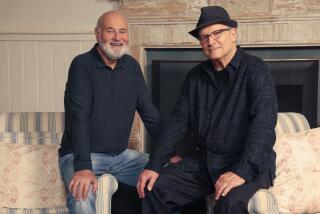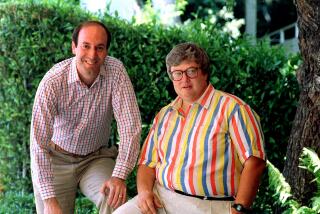Ebert’s New Partner Brings Change and Continuity
- Share via
The fuss in film criticism circles over the elevation of non-critic Richard Roeper to one of the most influential jobs in the field has died down.
“Ebert & Roeper and the Movies” has been on the air more than two months, settled into its small portion of the TV landscape. Movie ads talk about those famous “two thumbs up” coming from “Ebert and Roeper,” as if the moviegoing public has always wondered which way Richard Roeper’s thumb might swing.
And the show, looked at independent of its history, is still a respectable half hour of TV and still valuable, one of the few programs about Hollywood that dares to challenge Hollywood.
But a great irony hangs over the show, one that, if you dwell on it, makes it harder to watch the new “Ebert & Roeper” show.
The irony is this: If the founders of the show, ex-Tribune film critic Gene Siskel and veteran Sun-Times critic Roger Ebert, had tried to get hired for it under the conditions that landed Sun-Times pop culture columnist Roeper the job, they wouldn’t have had a chance.
What the three finalists for the role replacing the late Siskel had in common was that they all fit familiar TV patterns. They were TV types more than they were working film critics, precisely the opposite of Siskel and Ebert.
Siskel, who died in February 1999, was balding, less than movie-star handsome and less than a “hot,” wired personality; he was not the kind of cool, even-featured smoothie television likes. Ebert, for all his talent as a writer and critic, is simply a larger man than the medium usually hires.
Yet without those two, their particular Mutt-and-Jeff dynamic and the authenticity they brought to the roles, their show never would have had a chance to turn into the long-running institution it has become. People believed and liked them precisely because they were not creatures of television.
That said, there has to be an antidote to TV’s celebrity-culture toxins, and “Ebert & Roeper” is about as close as it comes these days.
By definition, Roeper’s presence makes the show a little more pop, part of a very gradual shift since it began on the Chicago PBS outlet, WTTW, a quarter of a century ago. That shift has seen the number of judgments grow larger and time devoted to discussing individual films grow shorter.
After the program left PBS in 1982 and moved into national syndication by Tribune Entertainment, a sister company of the Chicago Tribune, it got a little lighter and brighter.
It moved in 1986 to its current home, Buena Vista Television, a Walt Disney company. And Siskel became more of a TV personality than a newspaper writer. In the dust-up with Tribune Co.--parent company of the Los Angeles Times--over the departure, Siskel stopped being a full-time film critic for the paper, writing instead a column that was a collection of short reviews of current movies.
When Siskel died, many thought Ebert should retire the show, so closely identified was it with their personalities. But to do so would only have given the “Entertainment Tonights” greater sway.
Film critics, of course, wanted one of their own to be tabbed. When Ebert was publicly critical of the New York Times for naming a non-film critic to fill that role at the paper, it seemed his thoughts on the matter were clear.
But in the season after Siskel’s death, Ebert ran the show as “Roger Ebert & the Movies,” with a series of guest co-hosts.
And as the year went on, it became pretty obvious that one of the first requirements was not familiarity with Jean Cocteau but camera-friendliness. Along with Roeper, the two finalists were Joyce Kulhawik, an entertainment reporter for a Boston TV station, and Michaela Pereira, an attractive young co-host of an Internet show.
Roeper got the gig, and Ebert has said his newspaper colleague was his first choice.
Roeper, who has had practice as a commentator for WFLD-TV, does a fine job on TV, pronouncing words clearly, delivering opinions grammatically and sounding like someone who has, as he has said, watched a whole lot of Ebert and Siskel.
Indeed, Roeper’s coherent presence in the chair is a testament to the influence Siskel and Ebert have had, teaching America to talk and think about film in terms more specific than “good,” “bad,” “boring” and “wow.”
Roeper certainly has written about movies and, more often, movie stars for his paper. His column drops snappy film references as if he spends entire weekends at the Humongo-plex.
But seeing a lot of movies, being able to make a “Terminator” comparison, is different from being a critic. People like Ebert--and Siskel in the early days--were not just going to movies and talking about them but also doing the grunt work of trying to shape their thoughts into coherent, defensible, engaging writing that took into account movie history and contemporary culture.
And that does matter. It does mean that Roeper’s opinions, including listing “Ferris Bueller’s Day Off” as one of his three favorite movies (along with “The Maltese Falcon” and the “Godfather” trilogy), have a little less standing.
To be frank, though, the fact that Roeper is not a film critic is a burr in the saddle of probably no more than 5% of the population.
When his TV work is compared with the much more widespread television practices of praising movies based on their publicity campaigns or “reviewing” them as an excuse to show clips of famous actors, Roeper will come across to most as a hard case.
He does criticize films, slamming the French “Human Resources,” which many critics liked, for moving “at an escargot’s pace.” He will scoff at the entire body of Adam Sandler movies.
But purists who watch the show are surely wondering why his focus is not so much on story or direction but on the performances of individual actors. It’s almost movie criticism as filtered through People magazine.
On the air, he and Ebert have been mostly in agreement, even when they disagree, with Roeper offering a chorus of “yeses” and “exactlys” as Ebert speaks. Probably by definition in this relationship--and it could change over time--there is certainly not the glorious tension that existed between Ebert and Siskel, the result of two prickly equals each sure of the superiority of his own opinions.
Here, for instance, is Roeper’s very conciliatory disagreement with Ebert over the latter’s praise of Billy Crudup’s performance in “Jesus’ Son”:
“Well, I didn’t like this movie when it came out. I know you did. And I think he does kind of overdo it in some of the scenes, and he overplays it. But it’s an interesting performance, and the guy’s obviously got a world of talent.”
It’s a far cry from the “Roger, you ignorant so-and-so” undertone of a lot of the Siskel-Ebert repartee.
But remember, this came in a show arguing that the Oscar nominators shouldn’t overlook films from the first half of the year and championing a number of very low-budget movies.
No matter what the background of the person delivering the opinions, that kind of cheerleading for movies as an art form doesn’t really happen anywhere else on commercial TV.
*
* “Ebert & Roeper and the Movies” airs at 6:30 p.m. Sundays on KABC-TV.
More to Read
Only good movies
Get the Indie Focus newsletter, Mark Olsen's weekly guide to the world of cinema.
You may occasionally receive promotional content from the Los Angeles Times.










